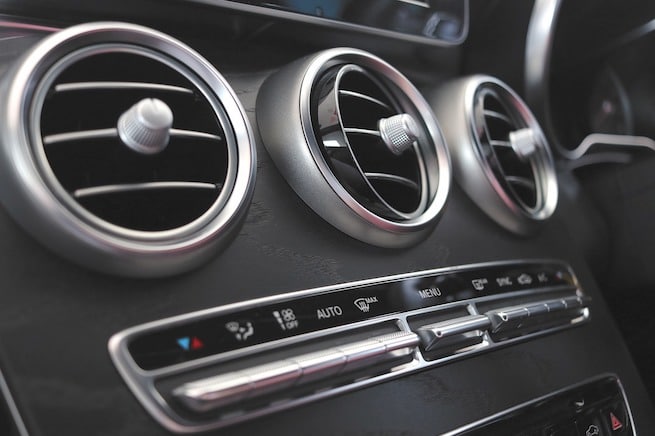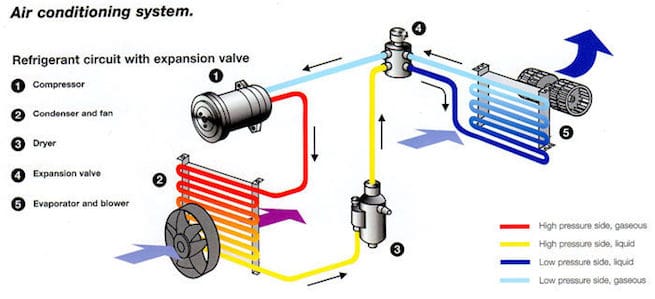How Do You Know If Your Car AC Needs Recharged or Freon?
A car’s air conditioning system has become a standard feature in most new cars. Although air conditioner units in vehicles are an expensive option, everyone feels it is one of the must-have features with our hot summer months and the need for comfort while commuting, running errands, and taking road trips.
Car air conditioner units can be expensive to repair, especially if the compressor unit needs to be replaced. So, how do you know if your car AC needs recharged? There are indicators to look for when you suspect there is something wrong with the cars AC system. Also, if you are purchasing a used vehicle, look for these telltale signs.
When the AC is on, and there is still hot air blowing through the vents, there is something amiss. Strange noises coming from the vents often indicate there is something inside the vents. Foul smells indicate moisture and mold build-up.
Water dripping inside the car may indicate the AC drain is clogged, and car repairs are needed. And finally, if you notice an oily substance around the joints of the AC pipes connecting to the compressor or cooling radiator, chances are there is refrigerant leaking.
Common Symptoms of Low Freon (How Do You Know If Your Car AC Needs Recharged?)
 Refrigerant freon is the liquid in your AC system that circulates through the system and alternately is converted from a liquid to gas to provide the cooling function. Older cars before 1994 used R-12 Freon, while newer cars now use R-134 Freon. R-12 Freon was found to cause depletion of the ozone layer and was phased out of all cooling systems. If you have a vehicle with R-12 Freon, it will need to be converted to an R-134 system. Common signs that your cars AC system is low on refrigerant:
Refrigerant freon is the liquid in your AC system that circulates through the system and alternately is converted from a liquid to gas to provide the cooling function. Older cars before 1994 used R-12 Freon, while newer cars now use R-134 Freon. R-12 Freon was found to cause depletion of the ozone layer and was phased out of all cooling systems. If you have a vehicle with R-12 Freon, it will need to be converted to an R-134 system. Common signs that your cars AC system is low on refrigerant:
1. Refrigerant leaks
As vehicles age, they are encounter all sorts of issues such as mild accidents, stones penetrating the cooling radiator to joints that are no longer secure. Small amounts of refrigerant leaking over time can lead to low Freon levels and less efficient cooling.
If you notice ice forming on the compressor, this is a sure sign that the refrigerant is low. Leaks around the compressor or at joints can also lower levels. Freon looks like thin grease while it is in a liquid state. Look for a film around joints that may even look a dirty brown color due to dirt and grime mixing with the Freon. These are typically small leaks.
If you observe Freon on the ground under the car, you have a more serious problem. Before adding more Freon to the system, verify where the leak is coming from and make arrangements for repairs.
2. Warm air instead of cold
With the AC system in operation, cold air should be blowing from the vents of your car to cool the interior of your car. If you have hot air instead of warm air blowing from the vents on a hot day, this is a sure sign that there is a problem with the AC system. There are several issues that can cause this problem.
The refrigerant may be to low for the system to operate efficiently. The compressor may have failed. If you hear a clicking sound, this could be an indicator. On many cars, there is a serpentine belt that turns the compressor. Check to ensure that this belt is still in place and turning the pulley on the compressor. Some cars will have a separate belt for this purpose.
If the cars AC needs Freon, have it checked for adequate refrigerant levels and that all systems are working properly.
3. Failing AC clutch
The pulley on your compressor is constantly turning, driven by the serpentine belt or a dedicated belt for this purpose. When AC is needed, a clutch engages the pulley causing the compressor to circulate Freon in the system and provide cooled air in the interior of your car.
When Freon levels are too low, a sensor is activated that prevents the clutch from being engaged. AC compressors and clutches also fail from time to time and require replacement. These are expensive components to replace, especially on older cars.
In many examples, there is nothing wrong with the AC compressor or the clutch. Freon levels have simply dropped too low due to a leak, and the compressor does not operate. Arrange for repairs to the leak and add additional refrigerant and recheck the system. Adding Freon without making repairs will provide you with AC for a limited time.
FAQ
Many consumers do not consider the AC system until it suddenly stops working. A little knowledge about why the AC system is not working can help you in conversations with a mechanic or a service advisor. Look for signs of a leak, check that belts are in place. These are clues that help the mechanic to solve your AC issue quickly. The following are some FAQ’s consumers have:
What is a recharge?
An AC system low on Freon needs to be recharged. AC recharges involve adding more Freon to the system. First, they will connect an AC manifold gauge set and assess if the Freon is low. These are specialized hand tools. If it is, Freon is added to pressurize the Freon to proper levels, and the system is tested. A thermometer is placed in one of the vents to monitor vent temperature airflow.
Since the system was low on Freon and needed a recharge, there probably is a leak in the system. Recharging the system without locating and repairing the leak usually means your AC system will only work for a short time blowing cold air before it begins blowing hot air again. Fix the leak before adding refrigerant.
How does the ac system work?

There are six major components to your vehicle’s air conditioner system.
- Compressor
- Condenser
- Evaporator
- Receiver
- Expansion valve
- Refrigerant or Freon.
The AC unit is a closed system. The compressor pressurizes the Freon from a gaseous state into a liquid state. The condenser resembles a radiator and is positioned in front of the radiator used to cool the engine. The condenser condenses the Freon forcing it to release heat, which is removed from the radiator. The evaporator located inside the cabin of your car. The fan blows warm air past the cooling evaporator, cooling it as it passes.
The receiver removes any moisture in the Freon just before it passes through the evaporator. Ice crystals could cause blockage or mechanical damage to the system. The expansion valve allows the spread of the liquid Freon at high pressure and, in the process, reduces to low pressure in the system. The refrigerant is the main component of the system. It is alternatively converted from liquid to a gaseous state and back again.
How long does Freon last in a car?
Freon can last in a car for a very long time. As long as cold air is coming from the vents and there are no leaks, you do not need to maintain the system. Car owners living in hot climates who use their AC systems routinely should expect the refrigerant to last at least three years or longer.
Anytime the system is low on Freon, have the system flushed to remove any possible particles that might clog the system and any moisture that may have entered the system. Replace the refrigerant with a new Freon. If the check engine light is on, there could be a problem with the air compressor. Most AC repair shops are able to replace it and provide a fluid exchange.
Ask your mechanic to check the brake pads if you need brake repair done.
Wrapping It Up
Insufficient cool air, the AC system blows only warm air, or if the defroster is not working, it usually means there is insufficient Freon in the system. Check for leaks, confirm drive belts are in place and have your system checked to assess if a recharge is required. The system should be flushed, leaks repaired, and new refrigerant added.
The vehicle’s air conditioning system is much needed if you leave in the South Florida area. If there is no air coming from your vents, then get a repair estimate to get that fix. AC repair is not like engine repair, and this issue can be solved quickly, and it won’t put a hole in your wallet. Low refrigerant freon will result in hot temperature air coming out of your vehicle AC vents.
Last Updated on: July 14, 2022

